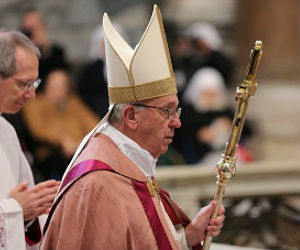Rather than continue with Augustine’s Confessions this week, I thought I would reflect rather on one of his Christmas sermons.Then I read the selection in this morning Office of Readings in the Liturgy of the Hours and remembered that today’s reading comes from Augustine himself, incidentally from one of his Christmas sermons. I read it, reflected upon it, and once again found it eye-opening and inspiring. Then I thought to myself, rather than post my own ramblings, why not let Augustine speak for himself this week?
And so I leave you with Saint Augustine and his words on the mystery and reality of Christmas. God bless you all, and I hope you have a joyous Christmas!
—
Awake, mankind! For your sake God has become man. Awake, you who sleep, rise up from the dead, and Christ will enlighten you. I tell you again: for your sake, God became man.

Nativity, Vasco Fernandes [Public domain], via Wikimedia Commons
Let us then joyfully celebrate the coming of our salvation and redemption. Let us celebrate the festive day on which he who is the great and eternal day came from the great and endless day of eternity into our own short day of time.
He has become our justice, our sanctification, our redemption, so that, as it is written: Let him who glories glory in the Lord.
Truth, then, has arisen from the earth: Christ who said, I am the Truth, was born of a virgin. And justice looked down from heaven: because believing in this new-born child, man is justified not by himself but by God.
Truth has arisen from the earth: because the Word was made flesh. And justice looked down from heaven: because every good gift and every perfect gift is from above.
Truth has arisen from the earth: flesh from Mary. And justice looked down from heaven: for man can receive nothing unless it has been given him from heaven.
Justified by faith, let us be at peace with God: for justice and peace have embraced one another. Through our Lord Jesus Christ: for Truth has arisen from the earth. Through whom we have access to that grace in which we stand, and our boast is in our hope of God’s glory. He does not say: “of our glory,” but of God’s glory: for justice has not proceeded from us but has looked down from heaven. Therefore he who glories, let him glory, not in himself, but in the Lord.
For this reason, when our Lord was born of the Virgin, the message of the angelic voices was: Glory to God in the highest, and peace to his people on earth.
For how could there be peace on earth unless Truth has arisen from the earth, that is, unless Christ, were born of our flesh? And he is our peace who made the two into one: that we might be men of good will, sweetly linked by the bond of unity.
Let us then rejoice in this grace, so that our glorying may bear witness to our good conscience by which we glory, not in ourselves, but in the Lord. That is why Scripture says: He is my glory, the one who lifts up my head. For what greater grace could God have made to dawn on us than to make his only Son become the son of man, so that a son of man might in his turn become the son of God?
Ask if this were merited; ask for its reason, for its justification, and see whether you will find any other answer but sheer grace
Questions for reflection:
- Have you been asleep, and if so, how?
- What do you need to do in order to wake up, to bear witness to the Lord?
—
This is part of a continuing series, Companions on the Journey, which travels along with a particular companion in the spiritual life, one of the great saints, in order discover how some of their writings might be applicable to our everyday lives. Currently, we are traveling with Augustine of Hippo through his work, Confessions. You can take a look at previous posts in the series or read the introduction.




